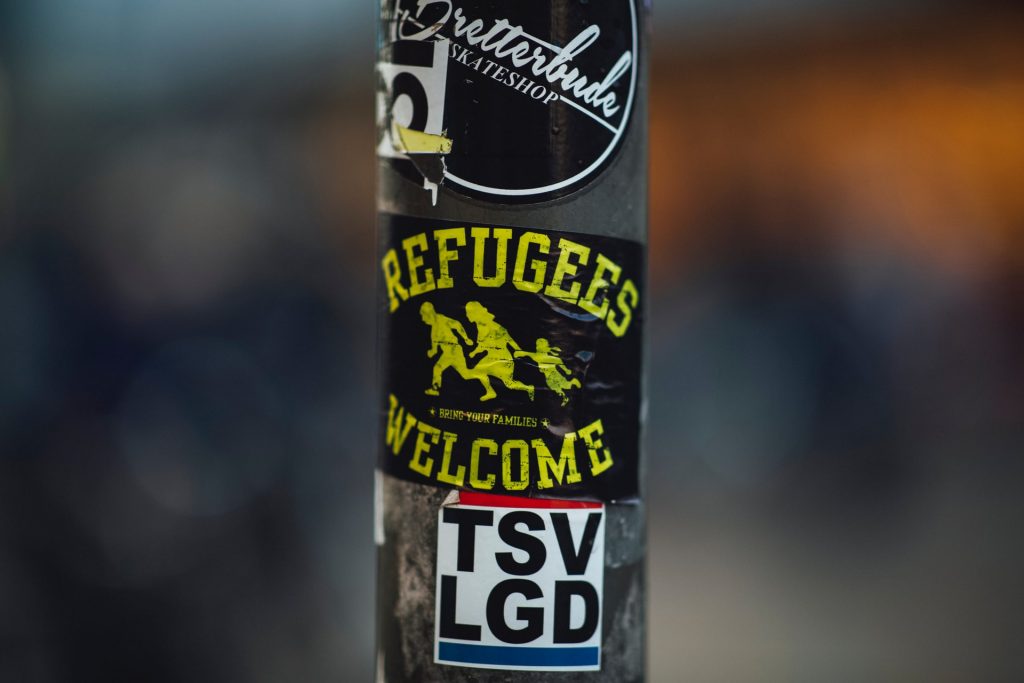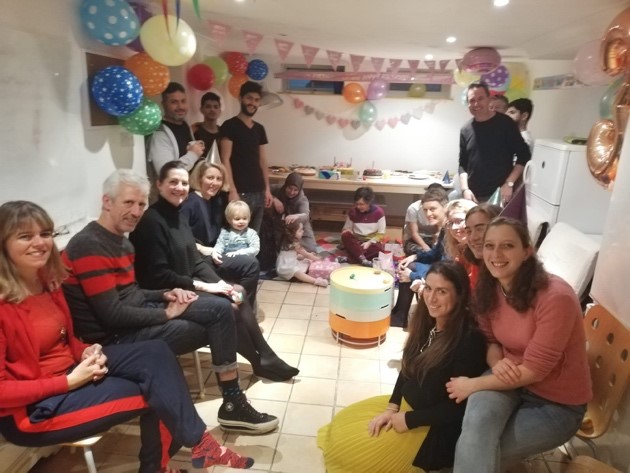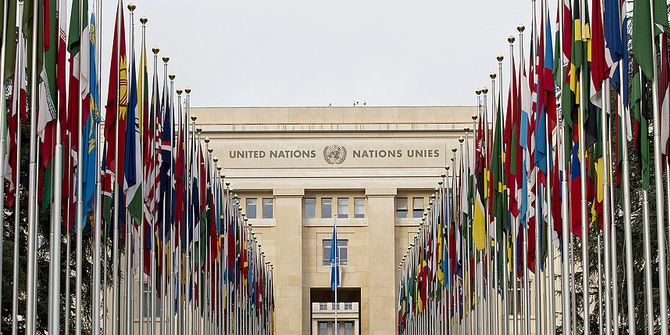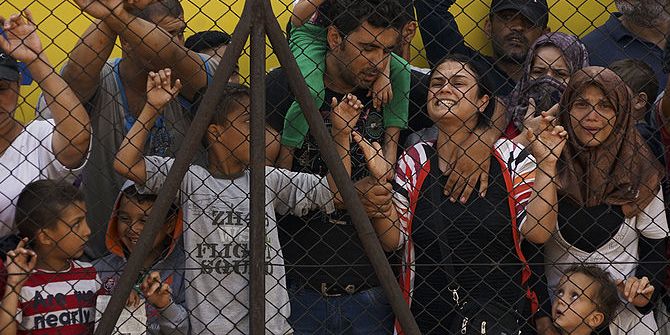As the number of displaced people arriving in Europe rose, UK religious communities responded by participating in the UK’s Community Sponsorship scheme. In this post, Gabriella D’Avino, Natasha Nicholls and Dr Marisol Reyes of the University of Birmingham write about the impact of Community Sponsorship and the religious motivations of those who take in displaced families. More findings on the project can be found here.

The rise in the number of displaced people arriving in Europe from the beginning of the war in Syria combined with the media coverage of the ‘refugee crisis’ in 2015, in particular the image of Alan Kurdi’s lifeless body on the Turkish shore, motivated individuals to take action to help refugees.
The UK government responded by establishing the Vulnerable Persons Resettlement Scheme (VPRS), enabling local authorities to offer sanctuary to Syrian refugees, and the Community Sponsorship scheme (CS), a private resettlement scheme whereby groups of individuals sponsor the resettlement of a refugee family in their local area. CS is inspired by a sponsorship scheme in Canada, established in 1979 for the resettlement of Vietnamese refugees and which has so far resettled over 300,000 refugees from across the world.
In the UK, faith communities welcomed the launch of CS, which presented an opportunity to respond to Pope Francis’ appeal of offering a safe place to refugee families. The Archbishop of Canterbury Justin Welby was the first to sponsor a group of refugees in 2016. Since then, almost 500 refugees have arrived in the UK sponsored by community groups.
Volunteer recruitment is fundamental to CS. The engagement and commitment of volunteers who work to raise funds, comply with Home Office application requirements, and support refugees’ resettlement are at the heart of the scheme. Social networks are key to volunteer recruitment, with many individuals asking their close friends and extended family to help. The majority of volunteers are white, middle class, retired or semi-retired women. Older volunteers tend to be more religious, are financially stable, have spare time and belong to more social networks, playing a key role in their communities.
The team of researchers working on CS at the Institute for Research into Superdiversity at the University of Birmingham found that religious involvement was a key motivator CS volunteers in the UK. From 2017 to 2021 we interviewed 22 groups linked to different religious denominations in which Christian and Muslim groups are the predominant backgrounds. In some cases, multi-faith groups have joined forces, resources, and skills to sponsor a refugee family in their community.
Several volunteers were contacted and recruited through their interpersonal ties in their churches’ congregations. Participants with religious affiliation were often motivated by their faith to participate in the scheme. Many reported finding the experience of supporting refugees deeply spiritual and transforming:
“What actually happened is that CS totally transformed my own life, my working life, and the life of my family in an amazing way. I never gave any thought at all, but because I have a very strong faith. I just felt that God was telling me, do something, do something, and as soon as I stood up for refugees the doors started to open, one after the other” (Urban, Male).

CS encouraged a rich exchange of knowledge about faiths and cultures and participants in the scheme have gained deep insight into other worlds. For volunteers living in areas with little experience of diversity, supporting a Muslim refugee family has provided an opportunity to learn about Islamic traditions, beliefs and rituals. On the other hand, refugee families have been introduced to Christian festivities and traditions celebrated in their new communities.
Interactions between volunteers and refugees have enabled them to learn from one another. Our study found that this communication and understanding are very important for the success of the scheme. Misconceptions, assumptions and stereotyping could hinder integration processes and undermine trust.
Volunteering in CS is activated by emotional gratification and empowerment. The predominance of older female volunteers in the groups contribute to shaping a type of affective solidarity characterised by compassion and care. However, as the ultimate goal of the scheme is to empower refugees and establish relations of equality, volunteers have to be mindful that their volunteering does not form relations of giving, patronage, and protection.
Emotions play an essential role in the activation and sustainment of CS groups. Positive moral responses such as compassion and sympathy towards the refugees were some of the justifications for the formation of a CS group. Volunteers were motivated by highly emotive grassroots responses of volunteers in Europe and expressed dismay at the lack of action from the UK government. There was anger that the government had not provided more help to refugees and the group was formed to fill a gap in support:
“I’d lived in other parts of the world and knew what it was to be an outsider. I’d watched the news programmes regarding and I thought that my church has a role to play in offering love to its neighbours” (Suburban, Female).
Volunteers viewed the unfolding refugees crisis as a chance to make a difference. Some of the volunteers aligned themselves with a moral framework; in many cases religious or spiritual belief was a motivating factor in joining or starting a CS group. Local faith leaders requested the assistance of their congregations and becoming part of the CS movement provided an opportunity for faith groups to practice their faith through action which helped those in a vulnerable position:
“Halfway through I felt like I have done something in my life that is by God and I thought if I can do something that counts, I will do this” (Urban, Female).
The ability to make a difference and play an active role in the community provides faith groups with the chance to enact their religious teachings within their local area. The Bible and the Quran provide clear direction in their teachings about how strangers should be treated. They both assert that strangers should be welcomed and treated with compassion and love. Leviticus 19:34 requests that foreigners are treated with love, they should be loved as one loves oneself. The Quran reiterates this requirement to love those who are strangers; the need to take strangers into our homes and care for them as though they are family (Surat Al-Hashr 59:9).
This religious call to love those who are strangers is exercised between CS volunteers and the refugee families they support. Volunteers open their communities and homes, and speak of the families as their close friends and sometimes their family. Reciprocal relations have developed between the two groups, with volunteers attending family events of the refugees and vice versa. A strong feeling of compassion flows through the CS groups, prompting involvement and sustaining the connections between the volunteers and the refugee sponsorship groups. Regardless of religion, people desire to treat others with compassion and with love, CS provides the opportunity to consolidate these feelings into action:
“In the news Syria was climbing in massive awareness of the atrocities, so we said we must do something about…I felt I could not personally let down the refuges. And because I stayed close to them, they respected that enormously and they trusted me” (Rural, Female).
Note: This piece gives the views of the author, and not the position of the LSE Religion and Global Society blog, nor of the London School of Economics.





Thanks. Our west Mids family been here 3 1/2 yrs now…